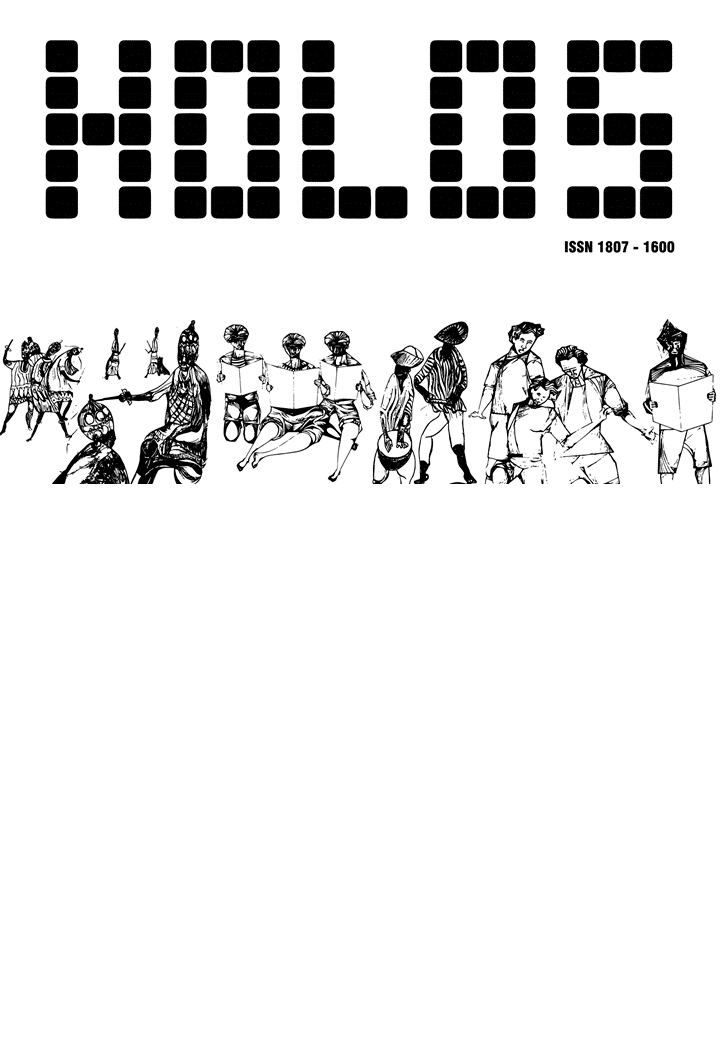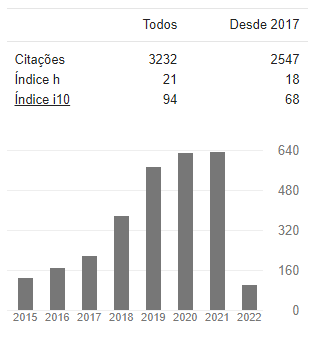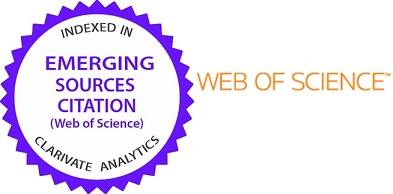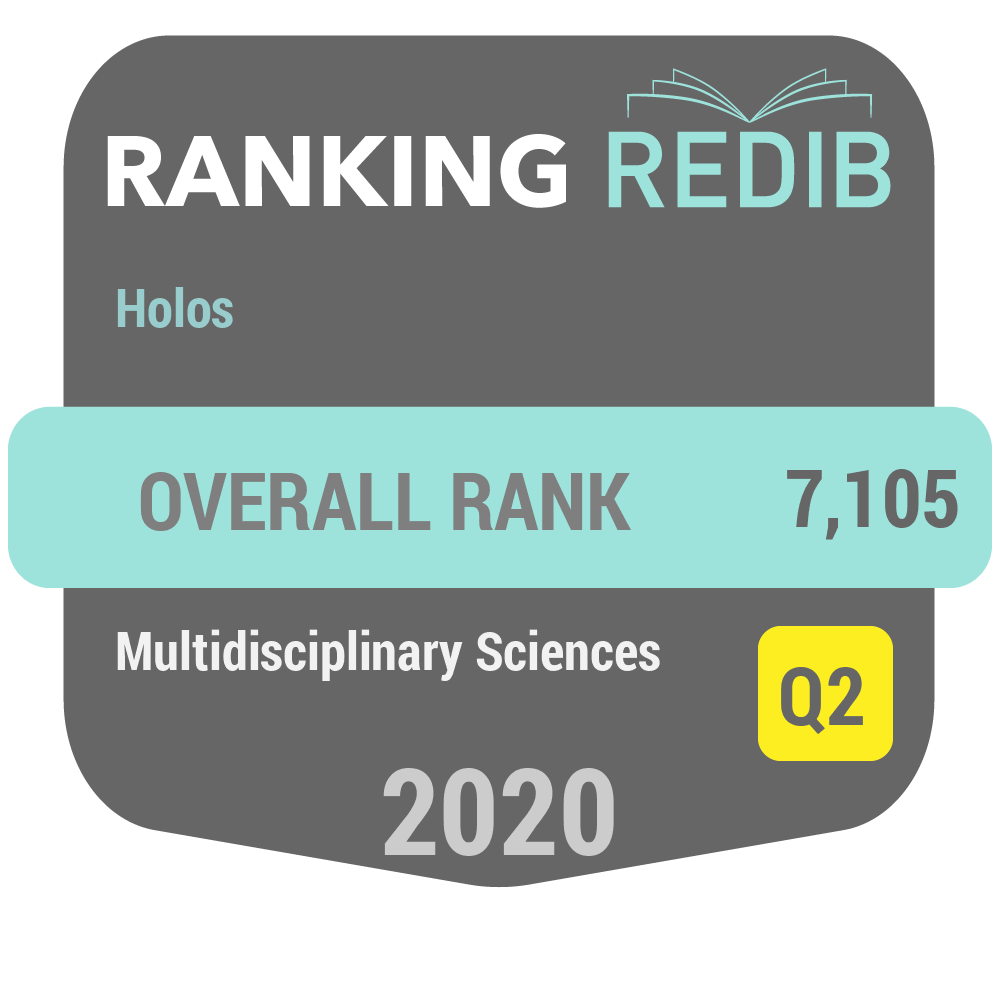THE ACTION OF LIGHT ON Saccharomyces cerevisiae METABOLISM UNDER DIFFERENT CULTURE CONDITIONS
Palavras-chave:
Yeasts, Physiological response, Sweet sorghum, SugarcaneResumo
Although there are several studies using yeasts, little is known about the physiological behaviour of yeasts Saccharomyces cerevisiae, mainly about industrial strains that are responsible for the production of ethanol and its adaptation to different environments. Thus, this study aims to evaluate the influence of the action of white and ultraviolet light associated with other stress factors in the fermentative medium and to analyze the fermentative performance of yeast FT-858 under different growing conditions. The yeast was grown in liquid medium (2% YPD) at 30°C for 12 hours at 250 rpm. After this period, the cells were recovered by centrifugation and inoculated into the fermentation medium based on sugarcane juice and sweet sorghum at concentrations of 18, 28 and 32° Brix, which were incubated at 30 and 42°C for 10 hours at 250 rpm, under the action of white light (BR), ultraviolet (UV) and without light (S / L), promptly analysing the physiological parameters. The fermentative performance of the yeast was affected when exposed to UV light at the highest Brix concentration and high temperature.
Downloads
Referências
Amorim, H. V., Gryschek, M., & Lopes, M. L. (2010). The success and sustainability of the Brazilian sugarcane? fuel ethanol industry. In Sustainability of the Sugar and Sugar? Ethanol Industries (pp. 73-82). American Chemical Society.
Bai, F. W., Anderson, W. A., & Moo-Young, M. (2008). Ethanol fermentation technologies from sugar and starch feedstocks. Biotechnology advances, 26(1), 89-105.
Batistote, M., Cardoso, C. A. L., Ramos, D. D., & Ernandes, J. R. (2010). Desempenho de leveduras obtidas em indústria de Mato Grosso do Sul na produção de etanol em mosto a base de cana de açúcar. Ciência e Natura, 83-95.
Bilotta, P., & Daniel, L. A. (2012). Utilização de lâmpadas germicidas na desinfecção de esgoto sanitário. Revista Ambiente & Água, 7(1), 120-129.
Bodvard, K., Jörhov, A., Blomberg, A., Molin, M., & Käll, M. (2013). The yeast transcription factor Crz1 is activated by light in a Ca 2+/calcineurin-dependent and PKA-independent manner. PLoS One, 8(1), e53404.
Cruz, M. L., Raminho, M. L. F., Castro, A. L. M., Guidini, C. Z., RESENDE, M. D., & Ribeiro, E. J. (2015). ESTUDO DA INFLUÊNCIA DA TEMPERATURA NA RESISTÊNCIA AO ETANOL DA LEVEDURA Saccharomyces cerevisae Y904. Blucher Chemical Engineering Proceedings, 1(2), 2260-2265.
Fiedurek, J., Skowronek, M., & Gromada, A. (2011). Selection and adaptation of Saccharomyces cerevisae to increased ethanol tolerance and production. Pol J Microbiol, 60(1), 51-8.
Gomes, P. W. P., Reis, J. D. E., Silva, D. D. S. C., da Costa, A. P. A., Malato, B. V., Muribeca, A. D. J. B., & Gomes, P. W. P. (2017). A aplicação da técnica multivariada (PCA e HCA) em dados microbiológicos e físico-químicos de méis comercializados em Cachoeira do Ararí e Salvaterra-PA. Scientia Plena, 13(6).
Guerrero-Beltr· n, J. A., & Barbosa-C· novas, G. V. (2004). Advantages and limitations on processing foods by UV light. Food science and technology international, 10(3), 137-147.
Hahn-Hägerdal, B., Karhumaa, K., Fonseca, C., Spencer-Martins, I., & Gorwa-Grauslund, M. F. (2007). Towards industrial pentose-fermenting yeast strains. Applied microbiology and biotechnology, 74(5), 937-953.
Hirasawa, T., Yoshikawa, K., Nakakura, Y., Nagahisa, K., Furusawa, C., Katakura, Y., ... & Shioya, S. (2007). Identification of target genes conferring ethanol stress tolerance to Saccharomyces cerevisiae based on DNA microarray data analysis. Journal of biotechnology, 131(1), 34-44.
Lee, S. S., Robinson, F. M., & Wang, H. Y. (1981, January). Rapid determination of yeast viability. In Biotechnol. Bioeng. Symp.; (United States) (Vol. 11, No. CONF-810554-). Univ. of Michigan, Ann Arbor.
Lopez-Malo, A., & Palou, E. (2005). Ultraviolet light and food preservation. Novel food processing technologies, 405-422.
Mardia, K. V. (1979). Multivariate analysis (No. 04; QA278, M3.).
Robertson, J. B., Davis, C. R., & Johnson, C. H. (2013). Visible light alters yeast metabolic rhythms by inhibiting respiration. Proceedings of the National Academy of Sciences, 110(52), 21130-21135.
Sakaki, H., Nakanishi, T., Tada, A., Miki, W., & Komemushi, S. (2001). Activation of torularhodin production by Rhodotorula glutinis using weak white light irradiation. Journal of bioscience and bioengineering, 92(3), 294-297.
Sousa, J. D., & Monteiro, R. A. B. (2012). Fatores interferentes na fermentação alcoólica para a produção de etanol. FAZU em Revista, (08).
Shima, J., & Takagi, H. (2009). Stress?tolerance of baker's?yeast (Saccharomyces cerevisiae) cells: stress?protective molecules and genes involved in stress tolerance. Biotechnology and applied biochemistry,53(3), 155-164.
Tisch, D., & Schmoll, M. (2010). Light regulation of metabolic pathways in fungi. Applied microbiology and biotechnology, 85(5), 1259-1277.
Tornaletti, S. (2009). DNA repair in mammalian cells. Cellular and Molecular Life Sciences, 66(6), 1010-1020.
Valduga, E., Tatsch, P. O., Tiggemann, L., Treichel, H., Toniazzo, G., Zeni, J., ... & Júnior, A. F. (2009). Produção de carotenoides: microrganismos como fonte de pigmentos naturais. Química Nova, 32(9), 2429-2436.
Zhao, X. Q., & Bai, F. W. (2009). Mechanisms of yeast stress tolerance and its manipulation for efficient fuel ethanol production. Journal of biotechnology, 144(1), 23-30.
Downloads
Publicado
Como Citar
Edição
Seção
Licença
Copyright (c) 2022 HOLOS

Este trabalho está licenciado sob uma licença Creative Commons Attribution-NonCommercial-NoDerivatives 4.0 International License.





































